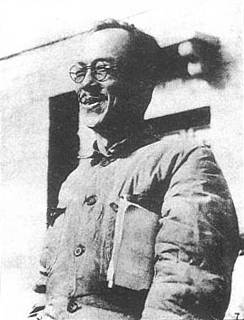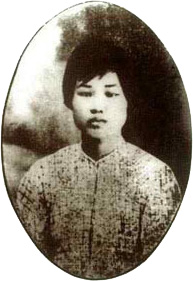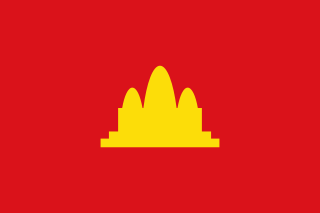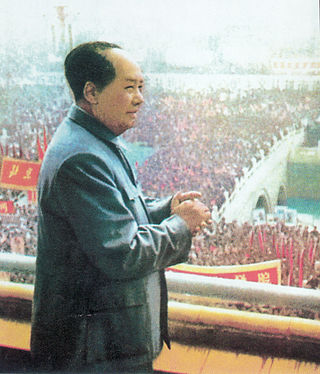Related Research Articles

Mao Zedong, courtesy name Runzhi, was a Chinese politician, Marxist theorist, military strategist, poet, and revolutionary who was the founder of the People's Republic of China (PRC). He led the country from its establishment in 1949 until his death in 1976, while also serving as the chairman of the Chinese Communist Party during that time. His theories, military strategies and policies are known as Maoism.

Pol Pot was a Cambodian communist revolutionary, politician and a dictator who ruled Cambodia as Prime Minister of Democratic Kampuchea between 1976 and 1979. Ideologically a communist and a Khmer ethnonationalist, he was a leading member of Cambodia's communist movement, the Khmer Rouge, from 1963 to 1997 and served as General Secretary of the Communist Party of Kampuchea from 1963 to 1981. His administration converted Cambodia into a one-party communist state and perpetrated the Cambodian genocide.

Maoism, also known as Mao Zedong Thought, is a variety of Marxism–Leninism that Mao Zedong developed while trying to realize a socialist revolution in the agricultural, pre-industrial society of the Republic of China and later the People's Republic of China. A difference between Maoism and traditional Marxism–Leninism is that a united front of progressive forces in class society would lead the revolutionary vanguard in pre-industrial societies rather than communist revolutionaries alone. This theory, in which revolutionary praxis is primary and ideological orthodoxy is secondary, represents urban Marxism–Leninism adapted to pre-industrial China. Later theoreticians expanded on the idea that Mao had adapted Marxism–Leninism to Chinese conditions, arguing that he had in fact updated it fundamentally and that Maoism could be applied universally throughout the world. This ideology is often referred to as Marxism–Leninism–Maoism to distinguish it from the original ideas of Mao.

Shen Dehong, best known by the pen name of Mao Dun, was a Chinese novelist, essayist, journalist, playwright, literary and cultural critic. He was highly celebrated for his realist novels, including Midnight, which depicts life in cosmopolitan Shanghai. Mao was one of the founders of the Chinese Communist Party and participated in a number of left-wing cultural movements during the 1920s and 1930s. He was the editor-in-chief of Fiction Monthly and helped lead the League of Left-Wing Writers. He formed a strong friendship with fellow left-wing Chinese author Lu Xun. From 1949 to 1965, Mao served as the first Minister of Culture in the People's Republic of China.

The time period in China from the founding of the People's Republic in 1949 until Mao's death in 1976 is commonly known as Maoist China and Red China. The history of the People's Republic of China is often divided distinctly by historians into the Mao era and the post-Mao era. The country's Mao era lasted from the founding of the People's republic on 1 October 1949 to Deng Xiaoping's consolidation of power and policy reversal at the Third Plenum of the 11th Party Congress on 22 December 1978. The Mao era focuses on Mao Zedong's social movements from the early 1950s on, including land reform, the Great Leap Forward and the Cultural Revolution. The Great Chinese Famine, one of the worst famines in human history, occurred during this era.
Ping-pong diplomacy refers to the exchange of table tennis (ping-pong) players between the United States and the People's Republic of China in the early 1970s. Considered a turning point in relations between the United States and the People's Republic of China, it began during the 1971 World Table Tennis Championships in Nagoya, Japan, as a result of an encounter between players Glenn Cowan and Zhuang Zedong. The exchange and its promotion helped people in each country to recognize the humanity in the people of the other country, and it paved the way for President Richard Nixon's visit to Beijing in 1972.

Kang Sheng was a Chinese Communist Party (CCP) official, best known for having overseen the work of the CCP's internal security and intelligence apparatus during the early 1940s and again at the height of the Cultural Revolution in the late 1960s and early 1970s. A member of the CCP from the early 1920s, he spent time in Moscow during the early 1930s, where he learned the methods of the Soviet NKVD and became a supporter of Wang Ming for leadership of the CCP. After returning to China in the late 1930s, Kang Sheng switched his allegiance to Mao Zedong and became a close associate of Mao during the Second Sino-Japanese War, the Chinese Civil War, and after. He remained at or near the pinnacle of power in the People's Republic of China from its establishment in 1949 until his death in 1975. After the death of Mao and the subsequent arrest of the Gang of Four, Kang Sheng was accused of sharing responsibility with the Gang for the excesses of the Cultural Revolution and in 1980 he was expelled posthumously from the CCP.

Edgar Parks Snow was an American journalist known for his books and articles on communism in China and the Chinese Communist Revolution. He was the first Western journalist to give an account of the history of the Chinese Communist Party following the Long March, and he was also the first Western journalist to interview many of its leaders, including Mao Zedong. He is best known for his book, Red Star Over China (1937), an account of the Chinese Communist movement from its foundation until the late 1930s.

Chen Boda, was a Chinese Communist journalist, professor and political theorist who rose to power as the chief interpreter of Maoism in the first 20 years of the People's Republic of China. Chen became a close associate of Mao Zedong in Yan'an, during the late 1930s, drafting speeches and theoretical essays and directing propaganda.

Yáng Kāihuì was the second wife of Mao Zedong, whom he married in 1920. She had three children with Mao Zedong: Mao Anying, Mao Anqing, and Mao Anlong. Her father was Yang Changji, the head of the Hunan First Normal School and one of Mao's favorite teachers.

The Red Guards were a mass, student-led, paramilitary social movement mobilized by Chairman Mao Zedong in 1966 until their abolishment in 1968, during the first phase of the Cultural Revolution, which he had instituted.
Luo Yixiu, a Han Chinese woman, was the first wife of the later Chinese communist revolutionary and political leader Mao Zedong, to whom she was married from 1908 until her death. Coming from the area around Shaoshan, Hunan, in south central China – the same region as Mao – her family were impoverished local landowners.

Kampuchea, officially Democratic Kampuchea (DK) from 1976 onward, was the Cambodian state from 1975 to 1979, under the totalitarian dictatorship of Pol Pot and the Communist Party of Kampuchea (CPK), commonly known as the Khmer Rouge (KR). It was established following the Khmer Rouge's capture of the capital Phnom Penh, effectively ending the United States-backed Khmer Republic of Lon Nol. After Vietnam took Phnom Penh in 1979, it was disestablished in 1982 with the creation of the CGDK in its place.
A supreme leader or supreme ruler typically refers to the person among a number of leaders of a state, organization or other such group who has been given or is able to exercise the most – or complete – authority over it. In a religion, this role is usually satisfied by a person deemed to be the representative or manifestation of a deity or God on Earth. In politics, a supreme leader usually rules over an authoritarian or totalitarian government and has a cult of personality associated with them. Historic examples are Adolf Hitler of Nazi Germany, Francisco Franco of Francoist Spain, Benito Mussolini of Fascist Italy and Joseph Stalin of the Soviet Union.

The Family: The Secret Fundamentalism at the Heart of American Power is a 2008 book by American journalist Jeff Sharlet. The book investigates the political power of The Family or The Fellowship, a secretive fundamentalist Christian association led by Douglas Coe. Sharlet has said that the organization fetishizes power by comparing Jesus to "Lenin, Ho Chi Minh, Bin Laden" as examples of leaders who change the world through the strength of the covenants they had forged with their "brothers". It was published by HarperCollins.
Year Zero: The Silent Death of Cambodia is a 1979 British television documentary film written and presented by the Australian journalist John Pilger, which was produced and directed by David Munro for the ITV network by Associated Television (ATV). First broadcast on 30 October 1979, the filmmakers had entered Cambodia in the wake of the overthrow of the Pol Pot regime.

Frank Dikötter is a Dutch historian who specialises in modern China. Dikötter has been Chair Professor of Humanities at the University of Hong Kong since 2006. Prior to that, he taught modern Chinese history at the School of Oriental and African Studies at the University of London. He holds an honorary doctorate from Leiden University and is a senior fellow at the Hoover Institution of Stanford University.

Stuart Reynolds Schram was an American physicist, political scientist and sinologist who specialised in the study of modern Chinese politics. He was particularly well known for his works on the life and thought of Mao Zedong.

The Cambodian genocide was the systematic persecution and killing of Cambodian citizens by the Khmer Rouge under the leadership of Prime Minister of Democratic Kampuchea, Pol Pot. It resulted in the deaths of 1.5 to 2 million people from 1975 to 1979, nearly 25% of Cambodia's population in 1975.

Mao Zedong's cult of personality was a prominent part of Chairman Mao Zedong's rule over the People's Republic of China from the state's founding in 1949 until his death in 1976. Mass media, propaganda and a series of other techniques were used by the state to elevate Mao Zedong's status to that of an infallible heroic leader, who could stand up against the West, and guide China to become a beacon of communism.
References
- ↑ "Philip Short". David Higham Associates. Retrieved 28 April 2022.
- ↑ "Short, Philip 1945- | Encyclopedia.com". www.encyclopedia.com. Retrieved 28 April 2022.
- ↑ Mao's Bloody Revolution, Revealed, 24 May 2007, retrieved 28 April 2022
- ↑ "Revealed - Mao's Bloody Revolution - TheTVDB.com". thetvdb.com. Retrieved 28 April 2022.